|
Printables |
PowerPoints |
Online exercises |
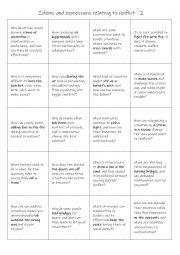
|
B1+-C1 Idioms and expressions relating to conflict 2
This is a speaking reinforcement activity to supplement the other worksheet I uploaded on 29/1/2025. Students working in pairs or small groups can either ask each other the questions or answer the question themselves.
Level: intermediate
Age: 12-100
Type:
Downloads: 118
|
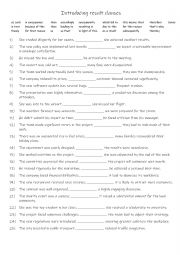
|
B1+-C1 Introducing result clauses
Learning result clauses is essential for effective communication and writing, as they clarify the cause-and-effect relationship between actions and outcomes, enhancing understanding and engagement. They improve writing quality by adding sophistication and logical flow, allowing for a dynamic expression of ideas. Mastery of result clauses fosters cr...
Level: intermediate
Age: 10-100
Type: worksheet
Downloads: 113
|
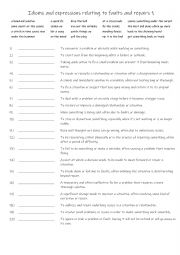
|
B1+-C1 Idioms and expressions relating to faults and repairs 1
First, students need to familiarise themselves with the 20 idioms and expressions and their meanings. Then they read the definitions to see which one is being described and write that word in the space provided Answers on page 2.
Level: intermediate
Age: 12-100
Type:
Downloads: 116
|
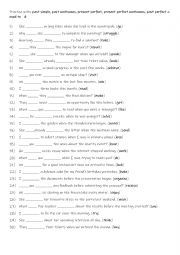
|
A2+-B1 Practise with past simple, past continuous, present perfect, present perfect continuous, past perfect & used to 4
Practising these tenses helps students express different aspects of time and actions effectively. The past simple is vital for describing completed actions, while the past continuous sets scenes or shows interruptions in the past. The present perfect connects past actions to the present, and the present perfect continuous highlights ongoing or repe...
Level: elementary
Age: 8-100
Type:
Downloads: 159
|
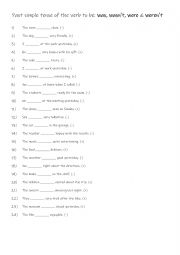
|
Past simple tense of the verb to be: was, was not, were & were not
This worksheet is suitable for A1+-A2 learners. Students read the sentence and complete the sentence with the correct form of the verb to be. They use the (+) or (-) sign at the end of the sentence to see if it needs a positive or negative form of the verb to be. Answers on page 2.
Level: elementary
Age: 8-100
Type: worksheet
Downloads: 114
|
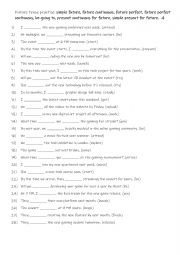
|
B1-B2 Future tense practise simple future, future continuous, future perfect, future perfect continuous, be going to, present continuous for future, simple present for future. 4
Using these future tenses helps students express future actions clearly. They can use simple future for predictions and decisions, future continuous for ongoing actions, future perfect for completed actions by a future time, and future perfect continuous for actions that will be ongoing up to a point in the future. Be going to is used for plans or ...
Level: intermediate
Age: 10-100
Type:
Downloads: 114
|
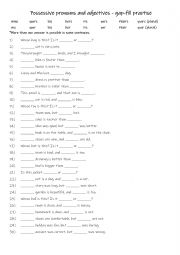
|
Possessive pronouns and adjectives - gap-fill practise
Students read the sentences and questions and complete it with the correct possessive pronoun or adjective. Answers on page 2.
Level: elementary
Age: 8-100
Type:
Downloads: 123
|
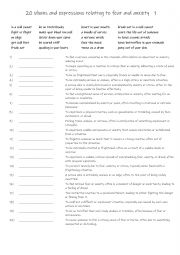
|
B1+-C1 20 idioms and expressions relating to fear and anxiety 1
First, students need to familiarise themselves with the 20 idioms and expressions and their meanings. Then they read the definitions to see which one is being described and write that word in the space provided Answers on page 2.
Level: intermediate
Age: 13-100
Type:
Downloads: 141
|
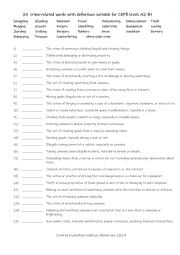
|
Match the crime words to their definitions
25 crime-related words with definitions suitable for CEFR levels A2-B1
Level: intermediate
Age: 12-100
Type: worksheet
Downloads: 109
|
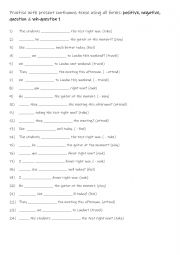
|
A1-A1+ Practise with present continuous tense using all forms positive, negative, question & question word with question 1
Learning the Present Continuous Tense in all its forms (positive, negative, question, and question word) is vital for effective communication in English. It enables students to describe actions happening at the moment, express temporary situations, and discuss future arrangements. Mastering the tense also allows for the formation of questions, help...
Level: elementary
Age: 8-100
Type:
Downloads: 119
|
|
|
|
|












